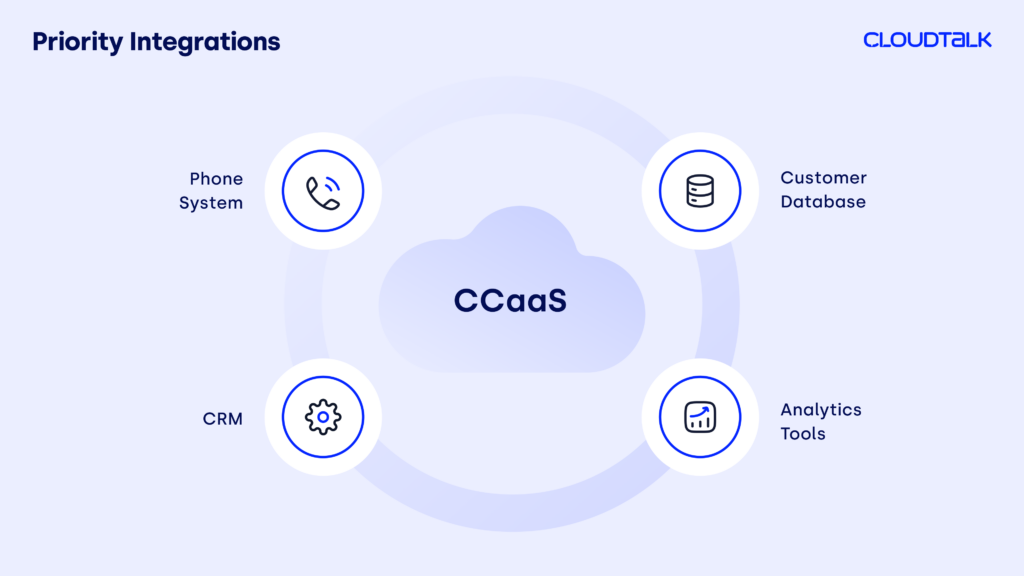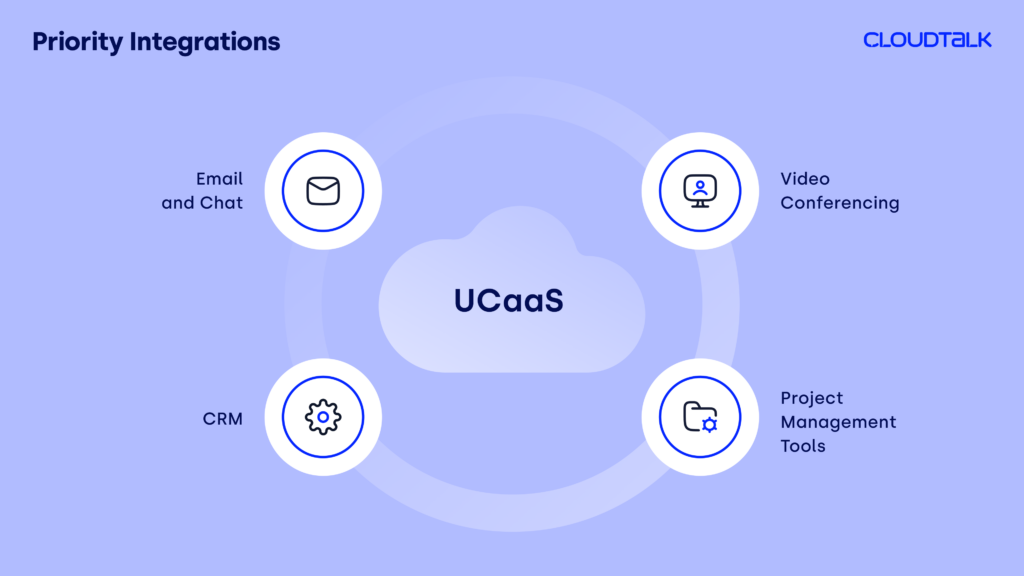UCaaS vs. CCaaS: What’s the Key Difference?

By the end of 2025, 74% of new Unified Communications adopted by organizations will be cloud-based*. To avoid regretful purchases, find out which alternative is best for your business.
In a vast sky of cloud options, choosing the right one for your business may not be as close to heaven as you imagine. Finding and incorporating new technology can be quite a challenge.
On-premise systems are fading fast, giving way to cost-effective cloud solutions like Unified Communications as a Service (UCaaS) and Contact Center as a Service (CCaaS).
Although they may seem alike, they play different roles: UCaaS improves internal communication and team collaboration, while CCaaS is focused on customer interactions.
With tons of features and overlapping functions, choosing between them can become overwhelming. So, to help you differentiate them, we’ll break down their principles, showing you what sets them apart and which one could best suit your business needs.
Key Takeaways
- UCaaS centralizes communication tools for internal teams, streamlining collaboration and boosting productivity organization-wide. This focus on unified capabilities is a key factor for 68% of UCaaS buyers, who consider all-in-one functionality essential in their purchasing decisions.
- CCaaS is vital for enhancing customer interactions across both sales and service, providing seamless, multichannel support that elevates the customer experience. This improvement is essential since poor customer service is one of the main reasons for losing customers.
- To decide whether UCaaS or CCaaS is the best fit for your business, you need to figure out your company’s core needs, specific goals, current technology infrastructure, and data privacy requirements. This article will help you ask yourself the right questions to uncover this information.
Get a head start with 50% off your first month.
What’s the Key difference between UCaaS and CCaaS
UCaaS and CCaaS are both cloud-based communication solutions without the need for a traditional on-premise contact center framework.
However, while they are designed with similar infrastructure, they serve different purposes and teams. Let’s take a look at how they measure up against their core principles.
Aspect
UCaaS
CCaaS
Primary Purpose
Enhancing internal communication and team collaboration.
Optimizing customer-facing interaction and sales management.
Key Tools
Voice calls, video conferencing, instant messaging, file sharing.
Multi-channel communication tools (phone, email, chat, social media).
Target Users
Internal employees and teams.
Customer support representatives, sales agents, and service teams.
Designed For
Improving team collaboration and productivity.
Providing seamless customer service and experience.
Priority Integrations
Productivity and collaboration tools (e.g., Microsoft 365, Slack).
CRM and customer service tools (e.g., Salesforce, Zendesk).
Scalability
Scales easily with team size and company growth.
Scales to meet customer service needs across various channels.
Basic Metrics
Internal communication performance, user engagement.
Customer satisfaction, response time, resolution rates, call quality.
So, What Exactly Is CCaaS?
As we mentioned, Contact Center as a Service (CCaaS) is a cloud-based solution that enables organizations to manage customer touchpoints, whether related to sales or customer service. In other words, the focus is on managing both inbound and outbound interactions.
It offers a scalable, flexible, and feature-rich platform that supports multichannel communication—including voice, email, live chat, social media, and SMS—providing a comprehensive tool for enhancing the customer experience.

Examples of CCaaS Platforms
- RingCentral Contact Center: RingCentral provides a user-friendly, omnichannel contact center solution with seamless integration into its communication suite. It’s ideal for businesses seeking advanced analytics, workforce management, and unified customer engagement tools.
- CloudTalk: CloudTalk supports customer-focused teams with intelligent call routing, real-time analytics, and CRM integrations like Salesforce and HubSpot, making it an ideal solution for SMBs. These features enhance the customer experience across both voice and messaging channels.
- Five9: With intelligent routing, robust analytics, and AI-powered tools, Five9 helps service teams scale efficient, personalized support. Known for smooth CRM integrations, it’s trusted by businesses aiming to elevate customer engagement.
- 8×8 Contact Center: It serves mid-sized to large businesses with secure contact center solutions. Known for seamless CRM integrations, it empowers companies to enhance customer engagement with unified communication tools.
- JustCall: Tailored for sales and support teams, JustCall provides call routing, SMS, and CRM integrations with platforms like HubSpot, enabling streamlined customer interactions across voice and messaging channels.
Advantages of CCaaS
- Multichannel Customer Experience
CCaaS platforms make juggling customer conversations across phone, email, chat, and social media effortless—all from one screen. This guarantees customers get consistent, personalized support no matter how they reach out.
With the rise of mobile-first communication, some businesses are even experimenting with vertical format video content to deliver quick, engaging responses that feel native to the customer’s device. - Productivity Boost through AI and Automation
Why sweat the small stuff? CCaaS packs powerful productivity features, using AI and automation to tackle repetitive tasks and streamline workflows, such as Call Summaries, AI Smart Notes, and Sentiment Analysis.
These tools allow agents to focus on what they do best—solving complex problems and delighting customers. Think of them as a productivity superpower, empowering your team to work smarter, not harder. - Workforce Management Tools and Integrations
Keeping your contact center in check is easier with seamless integrations to CRMs and management tools. Agents can work their magic with access to detailed customer info, making every interaction feel tailored and seamless. - Cost Savings With a Pay-As-You-Go Model
CCaaS takes the pressure off your budget with a flexible pay-as-you-go model—no hefty upfront costs or surprise fees. You only pay for what you need when you need it. - Seamless Scalability for Business Growth
No matter what stage your business is at, CCaaS grows with you. With just a few clicks, you can scale your contact center up or down, ensuring your operations remain efficient and adaptable.
Limitations of CCaaS Solutions
- Reliability of Internet Connection
Since we are talking about a cloud-based solution, CCaaS does need a solid internet connection to run smoothly. - Relying on Support for Hight-Level Customization
Suppose your business has specific communication needs, like integrations with older and on-premise systems. In that case, you may need vendor support to achieve these customizations and ensure the solution fully meets your requirements.
What Is UCaaS?
UCaaS, or Unified Communications as a Service, is designed to streamline internal communication by integrating various communication tools into one cohesive platform.
Picture all the ways your team communicates—voice calls, video conferencing, messaging, and file sharing. Now, imagine having all of these tools seamlessly connected under one roof, accessible from anywhere with an internet connection. That’s UCaaS.
Instead of managing separate systems for calls, meetings, emails, and chats, UCaaS brings everything together in one place. It’s like moving from a scattered collection of single-use gadgets to an all-in-one productivity suite that just works.

Examples of UCaaS Platforms
- Dialpad: A powerful unified communications hub that leverages AI, Dialpad enhances team collaboration with real-time transcriptions and voice intelligence. Its interface smoothly integrates with Google Workspace and Microsoft 365.
- Cisco Webex: With a legacy in networking and communications, Cisco’s Webex platform offers a robust UCaaS solution encompassing video conferencing, messaging, and calling. Known for its security and reliability.
- Nextiva: Offers an all-in-one UCaaS solution that integrates voice, video, messaging, and collaboration tools. It caters to businesses seeking to streamline communications and improve customer engagement.
- Vonage: Flexible UCaaS platform tailored for businesses of varying sizes. Its strong API capabilities allow for extensive customization and integration, appealing to organizations looking to tailor their communication solutions.
Advantages of UCaaS
- Enhanced Team Collaboration
UCaaS enables seamless collaboration from anywhere with integrated video, messaging, and real-time document sharing, keeping teams connected and efficient. - Cost Savings With Cloud Shift
The shift to cloud-based infrastructure eliminates the need for expensive on-premises hardware and maintenance. The subscription-based model ensures predictable expenses, avoiding unexpected repair or upgrade costs. - Growth With No Pain
If you’re expanding your workforce, UCaaS makes adjustments simple with no need for additional hardware or service interruptions. Businesses can adapt their communication capabilities effortlessly, supporting growth and change as needed. - Boost Team Productivity
UCaaS enhances productivity by integrating multiple tools into one platform. Quick access to all channels and shared documents means fewer workflow disruptions. With features like presence indicators, teams can streamline communication, coordinate tasks efficiently, and maintain focus.
Limitations of UCaaS Solutions
- Implementation Complexity
Deploying UCaaS can be more complex than expected. The initial setup might involve significant planning, data migration, and staff training to ensure a smooth transition. This complexity can require dedicated IT resources. - Cost of Implementation
While UCaaS generally reduces long-term costs, the initial implementation can be pricey. Businesses may need to invest in network upgrades, new hardware, or consultation services to get started. - Network Dependence
UCaaS relies heavily on a stable and high-speed internet connection. Any disruption in network service can impact call quality, video streaming, and overall communication capabilities. - User Adoption Challenges
Adopting new technology always comes with a learning curve. Ensuring that employees are comfortable using a new UCaaS platform can take time and training.
UCaaS or CCaaS? Ask Yourself the Right Questions
To pick the best option for your business, start by understanding what is really missing. Ask yourself the right, eye-opening questions to uncover those gaps or challenges holding you back.
Questions
UCaaS
CCaaS
Need help carrying out collective tasks?
Want to unify internal communication channels?
Do your customers want better support?
Looking to enhance your sales team’s performance?
Is your team overloaded with workflow?
Need to hold large video conferences?
Want to follow the consumer journey in more detail?
Want to increase your customer satisfaction?
Seeking ways to improve your operations team’s efficiency?
Want to eliminate bottlenecks in your sales funnel?
Want to identify customers with more profitable profiles?
Interested in driving higher employee engagement?
Both of them together? Why not?
If you’re wondering why you need to choose between them, you’re already on the right path. The truth is that you don’t. On the contrary, the combination of UCaaS and CCaaS is a powerful option for businesses that want an integrated and synergistic solution.
With this approach, businesses can create a smoother experience for everyone. Instead of jumping between systems, your team has everything they need in one place, whether it’s chatting with coworkers, selling products, or helping customers.
The benefits go beyond day-to-day convenience—integrating UCaaS and CCaaS is also a smart move financially. Rather than managing multiple tools, licenses, and maintenance costs, a single system simplifies everything. It’s an investment that pays off by uniting people, cutting costs, and, most importantly, keeping customers happy.
Around 94% of All Companies Worldwide Use Cloud Software*
It’s no wonder the business world is now nearly fully immersed in the cloud—a shift that has become essential for companies looking to take their businesses to new heights.
A significant driver of this transformation is the tremendous value that Unified Communications as a Service (UCaaS) and Contact Center as a Service (CCaaS) bring to businesses at affordable costs. These solutions have opened up access to advanced features that enable even small and medium-sized companies to scale effectively and compete with larger organizations.
As cloud technology solidifies its role as the backbone of modern business infrastructure, companies prioritize cloud-based solutions more than ever. By the end of 2025, an estimated 85% of organizations are expected to adopt a “cloud-first” approach. So, don’t be the last one to adopt it.
Source:
- The Best Unified Communications Statistics for 2022 – UC Today
- High-Tech Forecast: Cloudy, With Showers Of Innovation
Make The Shift To A Cloud-First Business Model
FAQs
Is CCaaS more suitable for larger enterprises, while UCaaS is better for smaller organizations?
Not necessarily. CCaaS is great for any size business with customer-facing roles managing customer service across channels. UCaaS is focused on internal communication, which is ideal for businesses needing unified voice, video, and messaging. Both are scalable to suit any company size.
How can I integrate UCaaS or CCaaS with my existing systems?
Most UCaaS and CCaaS platforms offer easy integration with CRM, ERP, and productivity tools through APIs or built-in connectors. Providers often support popular tools like Salesforce, Microsoft 365, and Slack, making it straightforward to add UCaaS or CCaaS to your current setup.
Can I switch from UCaaS to CCaaS or vice versa if my business needs to change?
Yes, many providers offer flexible options, allowing companies to switch between UCaaS and CCaaS or even combine them as needs evolve. This ensures businesses can adapt communication tools to changing demands without significant disruption or additional hardware.
What are the similarities between UCaaS and CCaaS?
Both UCaaS and CCaaS are cloud-based, scalable, and accessible from anywhere. They reduce the need for on-premises infrastructure, integrate easily with CRMs and productivity tools, and focus on improving communication, whether for internal collaboration (UCaaS) or customer service (CCaaS).
Who are the leading providers of UCaaS and CCaaS?
Top UCaaS providers include Microsoft Teams, Zoom, and Dialpad. Leading CCaaS providers include CloudTalk, Five9, Talkdesk, and Justcall. Many of these vendors offer integration-friendly platforms that suit various business needs, from small companies to large enterprises.
How much does UCaaS cost?
UCaaS pricing varies widely but generally starts around $20–$50 per user per month, depending on features like video conferencing, messaging, and integrations. Larger enterprises might pay more for additional features, customization, and higher support levels.

























